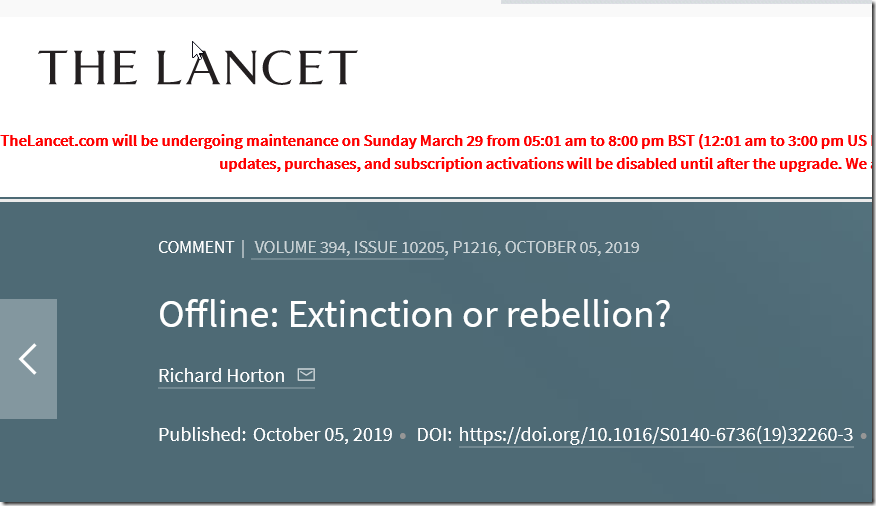By Paul Homewood
Yesterday I reported how Guido had caught the Lancet’s editor, Richard Horton, red handed after lying about the coronavirus on Question Time. This occurred during a rant attacking the government’s handling of the crisis, despite the fact that they were actually following the Lancet’s own recommendations at the time.
It turns out however that Horton is not the impartial expert we were led to believe. Last October he wrote this comment piece for the Lancet, praising Extinction Rebellion and calling for health workers to campaign for its far left policies:
An unprecedented social and political disruption is about to take place. Nothing like it will have been seen for a generation. The outcome could be transformational. Or it could be met with indifference. Remember the antiglobalisation protests in Genoa in 2001? Or the marches against the Iraq war in 2003? The outcomes of October, 2019, depend on the intensity of resistance. What part should health workers play in one of the greatest social movements of our time? The occasion before us is 2 weeks of non-violent direct political action, beginning on October 7. Billed as an “International Rebellion”, millions of people will gather in cities around the world. They will “continue to rebel against the world’s governments for their criminal inaction on the climate and ecological crisis”. Citizens are encouraged to take as much time off work as possible. Extinction Rebellion puts it like this: “Because time is running out. We’re almost at the point of no return. The governments are doing nothing. Businesses are doing nothing. The situation is urgent.” There are three demands—first, tell the truth; second, act now; third, go beyond politics to create a citizens’ assembly. A citizens’ assembly will reclaim control from a paralysed political process. To challenge corporate lobbyists. To explore the complexity of our shared predicaments. And to agree solutions. In sum, to break the political deadlock. What does any of this have to do with medicine?
The climate crisis is one of the greatest threats to the health of humanity today. A 2·0°C or higher rise in global mean surface temperature above pre-industrial levels is an acute danger to human and natural systems. We are presently living in a period of accelerating risk. The world needs to see a deepening commitment from governments to stabilise temperatures at 1·5°C above the pre-industrial period. Many health workers feel marginal to the mainstream political debate about this civilisational crisis. As one public health worker wrote recently, “I can be a booster for the field, but often I’m discouraged.” She went on: “Science in the traditional patterns and timescale is not going to get us there. Old-school conference[s]…are bad for the world…universities continue business as usual. Are we reinventing anything? The world is waking up to climate change as an issue. Is science?” Indeed, is medicine? Here is a paradox. It is the robust evidence gathered by scientists that has provided the political force for the growing public awareness about the climate emergency. And yet science itself is strangely reticent. The Royal Society is the UK’s leading scientific academy. It is dedicated to promoting excellence in science. But its activities to scale up political action to address the climate crisis are anaemic. The Royal Society has projects on low carbon energy and greenhouse gas removal. Its policy initiatives include work on energy, environment, and climate. But the Royal Society’s actions are empty of passion, devoid of campaigning, and seemingly disengaged from politics. Contrast the UK’s response to the threat of mass extinction with the US. This week, Margaret Hamburg, Chair of the Board of Directors of the American Association for the Advancement of Science (AAAS), wrote to scientists under the headline, “Our Moment to Combat Climate Change is Now”. In sharp words, she invited scientists to donate to AAAS’s campaign for political action: “We have a narrow window of time to take decisive steps to address climate change…we must activate the science community to speak up in new ways to address the impacts of climate change at the local, state, national, and global level. And we need to act now.” The UK’s scientific community, along with scientists in most high-income countries, is simply doing too little to engage civil society and politicians in the struggle for climate justice.
This failure of scientists to rise to the challenge of the current environmental crisis must be challenged. The health community is at least injecting moral force into the political debate about climate action. In London, Doctors for Extinction Rebellion is “a collective of health professionals who agree with Extinction Rebellion’s call for urgency and non-violent direct action”. With their focus on planetary health, they will play a prominent part in the forthcoming protests. It might be an exaggeration to say health workers have 14 days to change the world. But not much.
https://www.thelancet.com/journals/lancet/article/PIIS0140-6736%2819%2932260-3/fulltext
He is entitled to his political views, but should not be allowed to get away with conflating them with science. Perhaps the biggest irony of his commentary is that the vast majority of climate scientists do not agree with the apocalyptic views of XR.
Meanwhile, given his extremist opinions, it is little surprise that Horton is currently being given so much air time on the BBC.



